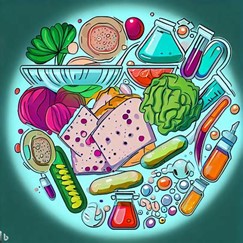“Everything in food is science. The only subjective part is when you eat it.” – A. Brown
“In the banquet of life, microorganisms are the unseen chefs, crafting the delicate balance between flavor and safety in every dish we consume” -A.I.blog
Course overview: Food is one of the basic necessities of life. Microscopic organisms (microbes) play a large role in the production, preservation, quality, and safety of food products. This course will be a collaborative endeavor between the course participants (both you and I) to understand the ways in which microorganisms affect foods from around the world, sometimes increasing and other times decreasing the quality and value of the food product. The Food Microbiology course work will examine essential concepts in food production, preservation, quality, and safety, with the goals of providing biology majors with an introduction to selection of the major concepts and practical applications of microbiology as it relates to food. Through a combination of readings, activities, laboratory exercises, and discussions, we will will gain insight into the complex interactions between microorganisms and the foods humans consume.
Topical course learning outcomes:
- Recognize the types of organisms relevant to food production, quality and safety
- Explain the importance of beneficial microbes in food production
- Describe the detrimental effects of microbes on food from the perspective of food quality and food safety
- Explain how environmental factors influence the growth of microbes in food products, and how they are relevant for controlling microbial growth
- Articulate how microbial fermentations are used in food production
- Be aware of the regulatory frameworks and standards in place to ensure food safety and prevent foodborne illnesses
- Quantify and identify microbes from food products using methods common in food microbiology
- Apply the framework of production, spoilage, and safety to food
This course will help students develop transferable skills that will enable them to:
- Develop hypotheses, design experiments, and critically analyze results related to food microbiology
- Participate in the process by which scientific knowledge is acquired by developing and executing a novel food microbiology project.
- Read and apply the current scientific literature.
- Effectively communicate ideas, which is a hallmark of a liberal arts education.
Integrative learning: This course is designed to foster integrative learning, encouraging students to connect knowledge and skills from various disciplines and experiences. Integrative learning will help prepare students for the complexities of the modern world by emphasizing the interconnectedness of ideas and the application of knowledge in diverse contexts. In this class students will:
- Evaluate how the content and tasks in this course are built upon what you learned in the Biology core curriculum
- Develop skills and ethos to mindfully integrate new knowledge and ideas into previous ones through connecting a topic in Food Microbiology to other areas of inquiry
- Use metacognitive strategies to hone communication skills
Click HERE for the 2024 FM schedule. Click HERE for draft of 2025 Syllabus

